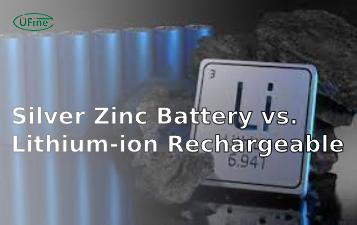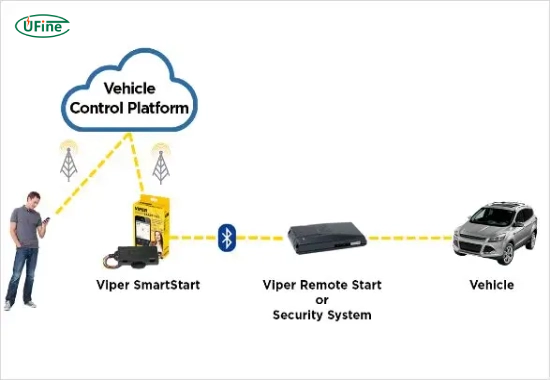
- Part 1. What is a remote start battery?
- Part 2. What makes lithium batteries different?
- Part 3. How lithium remote start batteries improve performance
- Part 4. Are lithium remote start batteries safe?
- Part 5. How long do lithium remote start batteries last?
- Part 6. Do lithium batteries charge faster?
- Part 7. Why lithium is better for smart vehicles
- Part 8. Are lithium remote start batteries eco-friendly?
- Part 9. Can I upgrade to a lithium remote start battery easily?
- Part 10. What are the best lithium remote start battery brands?
- Part 11. FAQs about remote start batteries
- Part 12. Final Thoughts
Why are lithium remote start batteries the future of car accessories?
Because they offer unmatched reliability, longer service life, faster charging, and better performance in extreme temperatures. With the growing demand for smarter, more efficient vehicles, the remote start battery has become a critical component. And lithium technology is leading the way.
In this long-form article, we’ll explore why lithium remote start batteries are taking over, how they compare to traditional batteries, and what this means for the future of automotive technology. If you’re looking for a smart upgrade to your car’s power system, this is a must-read.
Part 1. What is a remote start battery?
A remote start battery is the power source that enables your car to start remotely—without you physically turning the ignition. It powers the remote start system, which can be operated via a key fob or smartphone app. This function is especially useful in extreme weather, allowing you to pre-heat or cool the car before stepping inside.
Traditionally, these systems have relied on lead-acid batteries. While functional, lead-acid batteries are heavy, slow to charge, and less reliable in cold or hot conditions. As vehicles become more digitally integrated, the demand for a more stable and efficient power source has led to the rise of lithium remote start batteries.
Part 2. What makes lithium batteries different?
Lithium batteries rely on lithium-ion or lithium iron phosphate (LiFePO4) chemistry. This makes them drastically different from their lead-acid counterparts. Here’s how:
- They are significantly lighter, reducing vehicle weight and improving fuel efficiency.
- They offer higher energy density, packing more power into a smaller size.
- They deliver consistent voltage, even under load.
- They are better at handling high and low temperatures.
- They have longer service life, often lasting up to a decade.
These advantages make lithium batteries ideal for remote start systems, which require quick, reliable power delivery every time.
Part 3. How lithium remote start batteries improve performance
Performance is where lithium shines. When you press the button to start your car remotely, the system requires an instant surge of power. Lead-acid batteries often struggle with this, especially in cold conditions.
Lithium batteries, however, provide:
- Fast and powerful starts even in freezing temperatures
- No voltage drop, which ensures smooth remote engagement
- More cycles, meaning you can start your car remotely thousands of times without degradation
They also recharge faster, so your system is ready again in no time.
Part 4. Are lithium remote start batteries safe?
Yes, modern lithium batteries are extremely safe. Advanced manufacturing standards and smart electronics have made them not only efficient but also reliable in terms of safety.
Each lithium remote start battery is equipped with a Battery Management System (BMS) that protects against:
- Overcharging
- Over-discharging
- Short circuits
- Overheating
- Thermal runaway
This BMS ensures that the battery operates within safe limits. And since lithium batteries don’t contain acid or emit harmful gases, they are also safer for the environment and your vehicle.
Part 5. How long do lithium remote start batteries last?
One of the strongest arguments for lithium batteries is their exceptional lifespan.
- A typical lead-acid battery lasts 3 to 5 years under normal use.
- A lithium battery can last 8 to 10 years, or even more, depending on usage and maintenance.
They also retain their efficiency over time. Even after 2000 to 5000 charge cycles, many lithium batteries still maintain over 80% capacity. That’s a massive improvement in both cost-effectiveness and convenience.
Part 6. Do lithium batteries charge faster?
Absolutely. Lithium batteries charge faster than traditional alternatives. This is due to their ability to accept higher currents during the charging process.
What this means for you:
- Shorter downtime between uses
- More consistent performance
- Less strain on your vehicle’s alternator
This fast-charging ability is especially helpful for cars that see frequent short trips or are heavily reliant on electronics.
Part 7. Why lithium is better for smart vehicles
Today’s cars are packed with smart features—infotainment systems, GPS, security cameras, and more. All of these systems demand a stable and reliable power source.
Lithium remote start batteries offer:
- Consistent voltage delivery, preventing electronic faults
- Lower self-discharge rates, so the battery holds power longer
- Better performance for auxiliary systems, even when the engine is off
As vehicles continue to evolve, lithium technology will become not just an upgrade but a necessity for many car models.
Part 8. Are lithium remote start batteries eco-friendly?
Yes, and here’s how:
- No toxic lead or acid is used in lithium batteries.
- They are 100% recyclable, and many manufacturers offer recycling programs.
- Their long lifespan reduces waste and the need for frequent replacements.
- They are more energy-efficient, cutting down on the total energy used during their lifecycle.
If you’re looking to make more eco-conscious automotive choices, switching to a lithium battery is a step in the right direction.
Part 9. Can I upgrade to a lithium remote start battery easily?
In most cases, yes. Upgrading to a lithium battery is often a simple plug-and-play process. Many lithium batteries are designed to fit into the same slot as a traditional lead-acid battery.
However, to ensure a smooth upgrade:
- Check compatibility with your vehicle model
- Verify voltage and amp requirements
- Choose a battery with a built-in BMS
- Consider professional installation if unsure
Once installed, most users report better starts, longer battery life, and improved system reliability.
Part 10. What are the best lithium remote start battery brands?
When choosing a lithium remote start battery, brand quality and customization are key. Here are some of the top performers in the market:
- Antigravity Batteries – Known for ultra-lightweight, high-performance batteries.
- Battle Born Batteries – Offers solid lithium iron phosphate (LiFePO4) options with long warranties.
- NOCO – Reliable and well-known for both chargers and lithium batteries.
- Renogy – Offers high-efficiency lithium solutions popular in both automotive and solar setups.
- Optima – Now expanding into lithium technology with advanced designs.
Ufine Battery deserves special mention. Ufine stands out by offering highly customizable lithium battery solutions, tailored to specific requirements. Whether you need a compact design, high cranking amps, or advanced BMS integration, Ufine Battery provides OEM and ODM services for remote start systems, making them a top choice for both manufacturers and advanced users.
If you’re looking for a battery that fits your exact needs, Ufine Battery is a name to consider.
Part 11. FAQs about remote start batteries
What is the main advantage of lithium remote start batteries?
The main advantage is reliable, high-performance starting combined with a longer lifespan. They also perform better in extreme temperatures and require less maintenance.
Can I install a lithium battery in my current remote start system?
Yes, in most cases. Many lithium batteries are designed to be drop-in replacements for lead-acid ones. Just ensure voltage and size compatibility.
Are lithium batteries worth the higher cost?
Yes. While the initial cost is higher, lithium batteries last 2 to 3 times longer, charge faster, and offer better reliability, making them more cost-effective over time.
What happens if I leave my lithium battery unused for a long time?
Unlike lead-acid batteries, lithium batteries have a very low self-discharge rate. They can sit unused for months and still retain most of their charge. However, it’s good practice to check and recharge them every few months.
Do lithium batteries work in freezing temperatures?
Yes. High-quality lithium batteries can operate in sub-zero conditions, often down to -20°C or lower. Some models include self-heating features to improve cold starts.
Part 12. Final Thoughts
Lithium remote start batteries represent the future of car accessories. With the world shifting toward smarter, more connected, and sustainable vehicles, the need for faster, lighter, and more reliable power is only growing.
From better cold-weather starts to longer battery life and customized solutions from companies like Ufine Battery, lithium technology is transforming how we think about automotive power.
If you’re serious about upgrading your ride and future-proofing your car’s performance, switching to a lithium remote start battery is one of the best moves you can make today.
Related Tags:
More Articles

What is the Difference Between Silver Zinc Battery vs. Lithium-ion Rechargeable?
Compare silver zinc and lithium-ion rechargeable batteries: energy density, cycle life, safety, cost, and uses in drones, medical devices, EVs, and electronics.
What are Watts and Watt Hours in Battery?
Understand watt vs watt-hour in batteries: key differences, how to calculate capacity, and why they matter. Includes free comparison table.
Best 10 Blood Pressure Monitor Battery Review: Finding the Most Reliable
Are you looking for a reliable Blood Pressure Monitor battery? Here is a complete guide with the top 10 best blood pressure monitor batteries.
Bluetooth Headphone Battery Guide: All You Need to Know
Maximize headphone battery life with expert tips! Learn how to charge, check, troubleshoot, and choose the best bluetooth headphone battery in 2025.
LiFePO4 Battery VS. Lithium-ion Polymer Battery: Which One Is Best?
Comprehensive comparison of LiFePO4 vs Lithium Ion Polymer batteries: energy density, safety, lifespan, cost. Find out which battery suits your needs in 2025.



